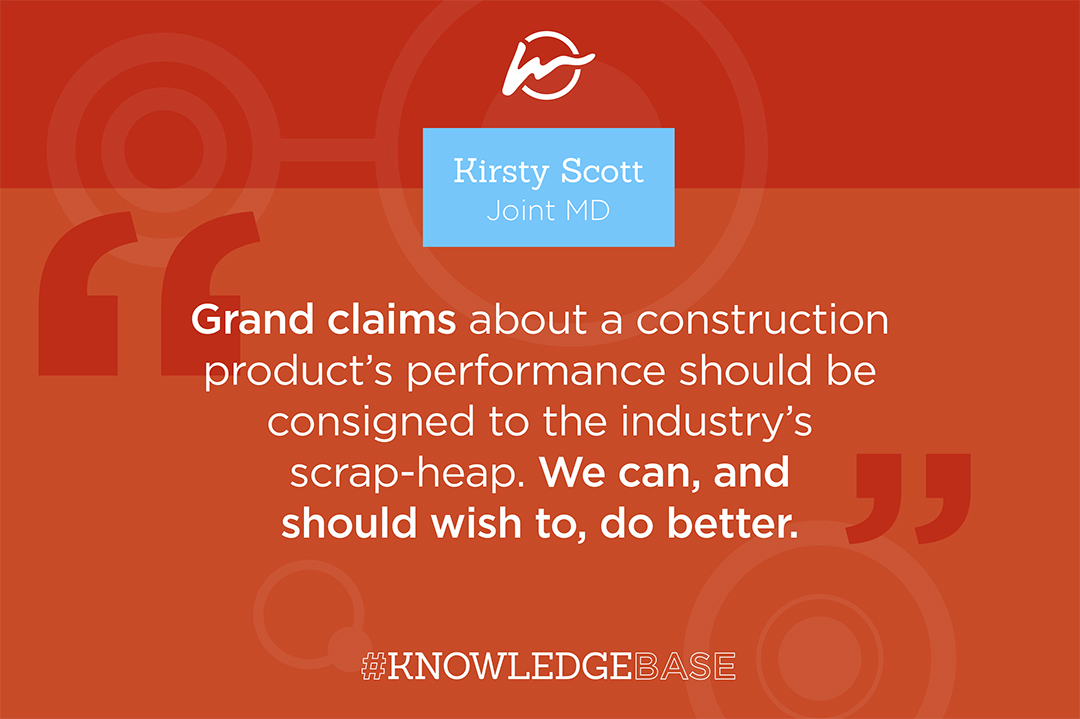Construction marketing, product information, and the drive for better standards
Published - 2nd April 2024

Ask anyone involved with construction products what they see as the biggest talking point of 2024 and you are likely to get the same answer: CCPI.
The Code for Construction Product Information (CCPI) is aiming to raise safety standards across the industry by ensuring that specifiers and contractors have up-to-date, easily accessible and accurate information on construction products. The Code sets down a clear marker for the standard that manufacturers must meet, with strict assessments in place to ensure that manufacturers – and others in the supply chain, such as merchants – are compliant, or are working towards a vastly improved standard.
The CCPI was conceived of to create confidence in the information available to specifiers and contractors, so that they can have a greater degree of certainty that the product they use matches the description available on the supplier’s website or datasheet.
Prompted by the tragedy of Grenfell Tower, which highlighted issues in leadership and culture across the construction sector, the Construction Product Authority created the Marketing Integrity Group to help ensure that this situation is avoided in future – something everyone in the industry should welcome.
- The Code for manufacturers – the first to be launched – includes 11 clauses setting out the minimum requirements that manufacturers must meet
- For distributors and merchants, the Code has four clauses
- There are five steps to approval for anyone signed up to the code: three of these for the manufacturer/distributor, and two for CCPI
- The CCPI recommends appointing a ‘Code Lead’ who heads up the assessment process internally
- For companies who pass the assessment process, the accreditation is in place for two years and companies can use the CCPI mark on their marketing throughout that time
Internal communication is key
Those participating in the first tranches of the CCPI assessment know that it is an in-depth process, requiring buy-in from across the business and collaboration not just across business divisions, but with external suppliers such as your web, design, PR and social media agencies too.
But the first stakeholders in the process are colleagues from across the company. Securing their buy-in at an early stage will help the process run more smoothly, and may help to give the company a better result in the long term.
In the first step of the assessment, staff from across the business will be asked to complete a survey and with minimum participation levels required, it’s essential that they are aware of what is required of them in advance. The CCPI assessment is all about giving an honest picture so that companies can identify areas where improvement is needed, so while you certainly shouldn’t coach colleagues on their answers, it will be helpful to give them key information, such as the deadline for completion, how much time they should set aside to complete the survey, and the purpose of the task.
That way, your colleagues are more like to give considered and honest answers.
It may be helpful to consider producing a brief guide or even a simple animated video setting this out in a way that is easy to understand and digest. You could host this on your company’s intranet, email it to all staff, or even host briefing sessions in team meetings – whatever will get the best response from your teams.
Alongside this, the person designated as ‘Code Lead’ will be submitting the company’s Management Systems Questionnaire, which details the systems in place for managing product information – identifying stakeholders, the process for reviewing information, and oversight of communication channels. Again, it is important that the organisations and individuals listed as stakeholders are kept informed and aware that they have been included in this document.
Once both of these surveys are submitted, the CCPI will follow up with individuals from across the business to conduct ‘validating discussions’ around the information received, so ensure that colleagues are made aware of this too. People can feel they’ve been put on the spot if they are not expecting a call from the assessors, and are more likely to feel underprepared and under pressure if that’s the case.
Assessment is just the beginning
The goal of the CCPI is to encourage continual improvement in standards of product information: so while some areas are a simple pass/fail, others are graded as ‘pass’, ‘partially met’, or ‘not met’ with companies granted a grace period of three months to rectify areas where the standard is not met, or six where it is partially met.
Again, this means that stakeholders from across the business – in particular your management team, but also marketing departments and any external agencies – will need to be on stand-by to implement the necessary changes. This could require changes to internal processes, but could as easily mean updating brochures or literature, the information on your website, datasheets, or any other marketing collateral.
The last thing any company aiming at CCPI accreditation wants is to be rushing to rectify areas where it falls short, so engaging with the key players early in the process will be essential. Ensure that your external marketing or communications agency is familiar with the scope of the Code itself, as well as with the timeframe for your submission so that they are ready to go if areas for improvement are identified.
And should your organisation pass, that’s not the end of the process – companies achieving accreditation will need to maintain their standards and revisit their product information regularly to maintain the CCPI mark.

Banish the superlatives
As a construction marketing agency, understanding the requirements of CCPI is imperative for us at Harris Creative. While the Code currently only covers manufacturers and merchants, in future we fully expect it to include installers too, meaning that everyone in the construction sector supply chain will have to understand the requirements set out by the assessors.
We are grateful to Rachel Philpott at the CCPI for her generosity in answering our questions on the assessment and accreditation process, and we know that we have work to do too to maintain the standards that our clients will need to meet.
Clarity of communication is key when it comes to the Code, and we support the move away from opaque, jargon-stuffed information. At Harris, we have always aimed for plain English wherever possible, and we welcome the guidance from the CCPI on what they deem to be acceptable or unacceptable language.
Much like greenwashing, grand and unsubstantiated claims about a product’s performance should be consigned to the industry’s scrap-heap. We can, and should wish to, do better.
So we will be challenging our clients to avoid unnecessary superlatives – if your products say they ‘guarantee’ results, or ‘ensure’ a certain level of performance, we will be the first ones asking you to back that up with testing data. Thanks to the CCPI’s robust processes, product information will become clearer and more factual, with the assessors’ mark adding credibility to marketing collateral.
Who knows – perhaps in the future, the CCPI will have a Code for construction marketing too? It’s a possibility that we, and any agency worth their salt, would welcome.
Harris »